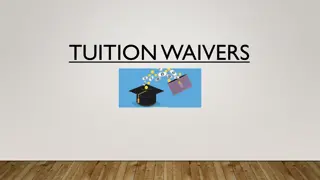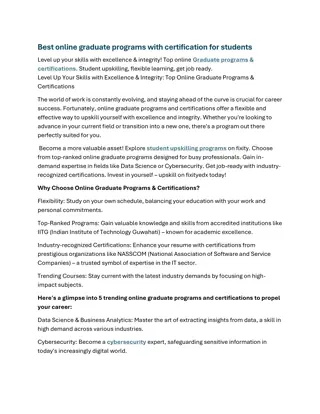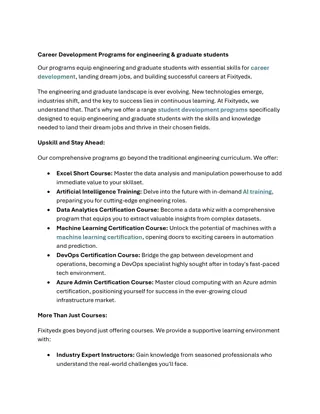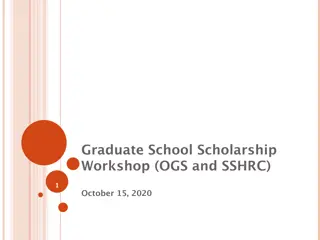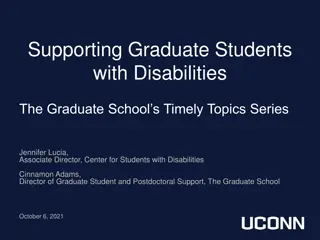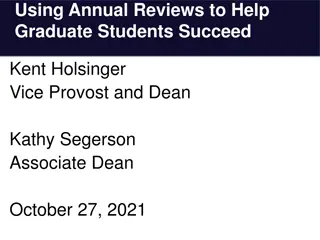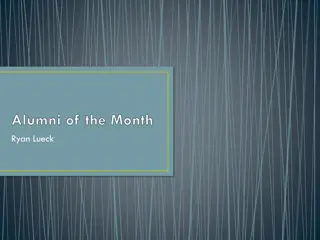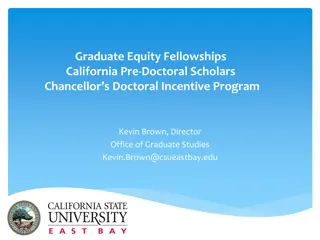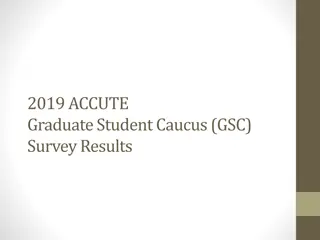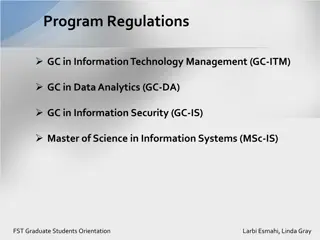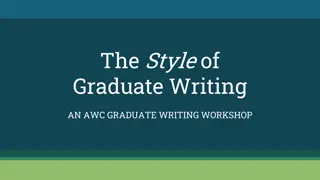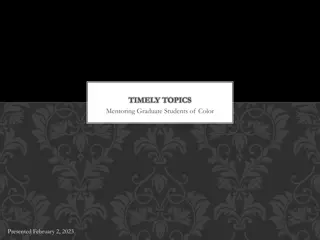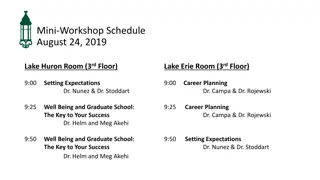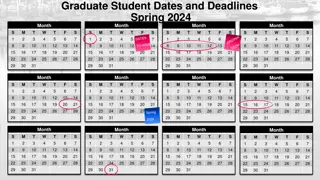Effective Time Management Strategies for Graduate Students
As a graduate student, time management is crucial for success. This guide by Abbie Richards, an Associate Professor in Chemical and Biological Engineering, explores managing time, setting goals, and balancing responsibilities in graduate school. It emphasizes prioritizing tasks, aligning goals with values, and making the most of limited time.
Download Presentation

Please find below an Image/Link to download the presentation.
The content on the website is provided AS IS for your information and personal use only. It may not be sold, licensed, or shared on other websites without obtaining consent from the author.If you encounter any issues during the download, it is possible that the publisher has removed the file from their server.
You are allowed to download the files provided on this website for personal or commercial use, subject to the condition that they are used lawfully. All files are the property of their respective owners.
The content on the website is provided AS IS for your information and personal use only. It may not be sold, licensed, or shared on other websites without obtaining consent from the author.
E N D
Presentation Transcript
Managing your time as graduate student ABBIE RICHARDS ASSOCIATE PROFESSOR IN CHEMICAL AND BIOLOGICAL ENGINEERING
What takes up your time in grad school Setting goals Managing your time
Differences in the Graduate School Experience Flexibility in your schedule Fewer classes Longer deadlines In-depth assignments New responsibilities teaching/TA
How will you spend your time? 6-9 hrs Time spent in class 15 hrs Studying or group work Research 20+ hrs 20 hrs TA Responsibilities Sleeping 56 hrs Eating 15 hrs
What else takes up time?? Commuting to school Exercising Friends/Family Personal growth
What are you left with? Not a whole lot
How to effectively use your time Determine what is important to you Set goals that align with your values Fill your time with activities that bring you closer to your goals
Goals Long-term goals What do you want to have accomplished by the end of your life? What do you want to have accomplished 20-30 yrs from now? Mid-term goals What do I hope to do achieve over the next 2-5 years? What do I want to accomplish this year? Short-term goals What to I want to accomplish this semester/month What do I hope to achieve today?
What are your goals? Think about one long-term, one mid-range and one short-term goal
SMART Goals Specific: Be blunt! Spell out exactly what you want to achieve. Measurable: Have a means of measuring whether your goal has been meet. Action Oriented: Describe your goals using action verbs and, at the very least, mentally outline the actual steps that you will take to accomplish your goal. Realistic: Make sure that your day to day goals are something that you actually can succeed at (particularly if it involves studying). Time Bound: Give yourself a time limit.
Get Started! Starting a project is often biggest barrier Break up big projects into smaller tasks
Finally Be flexible but also honest with yourself If you didn t achieve your goal because you lost your focus, admit as much, take a short break, and begin again.
The Big Picture Creating your PhD/Masters committee Develop a program of study Holding regular committee meetings Conducting Research Reading publications Lab work Tracking results Start writing! Settling on a graduate mentor/research topic Receiving a Graduate Degree writing, writing, writing The Thesis/Dissertation defense Communication of research Conferences/seminars Abstract submission deadlines Publications Semester Coursework/TA responsibilities Assignments Grading, office hours, labs Qualifying exams/ Comprehensive Exams Even more research More research..
Steven Coveys Seven Habits of Highly Effective People First 3 habits Habit 1: Be Proactive Take initiative and responsibility for actions Habit 2: Begin with the End in Mind Use your goals drive daily activities Habit 3: Put First Things First Manage daily activities to align with goals
Time Management Matrix Taken from Steven Covey s text 7 Habits of Highly Effective People
Important vs. Urgent Activities Important activities will directly impact your goals Urgent activities demand immediate attention Some Urgent Activities are Not Important
Time Management Matrix Two types Urgent/Important matters you cannot control Urgent/Important matters that you can control Come up with personal strategies to keep important matters from becoming urgent Taken from Steven Covey s text 7 Habits of Highly Effective People
Urgent and Not Important Time sensitive distractions Can come from friends and family Don t be afraid to say no! Hide! Taken from Steven Covey s text 7 Habits of Highly Effective People
Not Urgent but Important Activities that further your goals Things you can plan for Not time sensitive Yet Spend your time here!
Not Urgent and Not Important Distractions to avoid completely Web browsing Randomly watching TV Facebook, Twitter, Google Chat Avoid spending time here
Time Management Matrix Taken from Steven Covey s text 7 Habits of Highly Effective People
Staying Organized Keep a to-do list Schedule time for things that do not have immediate deadlines Reading papers Writing Try to have blocks of time for research/teaching Set aside time for personal/physical/emotional health Evaluate your ability to stick to the schedule
Work expands so as to fill the time available for its completion -PARKINSON S LAW, CYRIL PARKINSON
Prevent Parkinsons Law from Coming True Set clear, concise goals regarding work to be done Define a reasonable and fixed amount of time to complete these tasks Attack the task with intensity and stick to your time limit
Big Rocks Dr. Stephen R. Covey, First Things First One day this expert was speaking to a group of business students and, to drive home a point, used an illustration I m sure those students will never forget. After I share it with you, you ll never forget it either. As this man stood in front of the group of high-powered over-achievers he said, "Okay, time for a quiz." Then he pulled out a one-gallon, wide-mouthed mason jar and set it on a table in front of him. Then he produced about a dozen fist-sized rocks and carefully placed them, one at a time, into the jar. When the jar was filled to the top and no more rocks would fit inside, he asked, "Is this jar full?" Everyone in the class said, "Yes." Then he said, "Really?" He reached under the table and pulled out a bucket of gravel. Then he dumped some gravel in and shook the jar causing pieces of gravel to work themselves down into the spaces between the big rocks. Then he smiled and asked the group once more, "Is the jar full?" By this time the class was onto him. "Probably not," one of them answered. "Good!" he replied. And he reached under the table and brought out a bucket of sand. He started dumping the sand in and it went into all the spaces left between the rocks and the gravel. Once more he asked the question, "Is this jar full?" "No!" the class shouted. Once again he said, "Good!" Then he grabbed a pitcher of water and began to pour it in until the jar was filled to the brim. Then he looked up at the class and asked, "What is the point of this illustration?" One eager beaver raised his hand and said, "The point is, no matter how full your schedule is, if you try really hard, you can always fit some more things into it!" "No," the speaker replied, "that s not the point. The truth this illustration teaches us is: If you don t put the big rocks in first, you ll never get them in at all." What are the big rocks in your life? A project that you want to accomplish? Time with your loved ones? Your faith, your education, your finances? A cause? Teaching or mentoring others? Remember to put these Big Rocks in first or you ll never get them in at all.

 undefined
undefined









